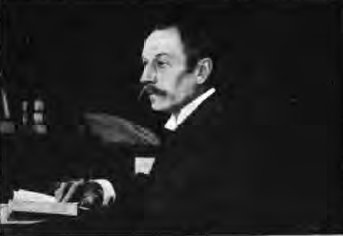[I]n R. V. W. Elliott’s classic 1957 study, “Runes, Yews and Magic”... he describes the Brittonic belief that the root of a churchyard yew grows out of the mouth of each corpse buried therein, thus sustaining the former and ensuring its continued survival.
Then there's the idea of the totenpass -- German for "passport for the dead" -- the name given to a Greek and Egyptian tradition of burying an inscribed piece of metal with the deceased, either hung around their neck or put inside their mouth. The inscription was a set of instructions for the dead person's spirit, so they wouldn't get lost in the next world.
Google Maps for the Afterlife, is the way I think of it.
These instructions were often amazingly detailed. One totenpass from Crete had the following inscription:
You will find on the right in Hades's halls a spring, and by it stands a ghostly cypress-tree, where the dead souls descending wash away their lives. Do not even draw nigh this spring. Farther on you will find chill water flowing from the pool of Memory: over this stand guardians. They will ask you with keen mind what is your quest in the gloom of deadly Hades. They will ask you for what reason you have come. Tell them the whole truth straight out. Say: 'I am the son of Earth and starry Heaven, but of Heaven is my birth: this you know yourselves. I am parched with thirst and perishing: give me quickly chill water flowing from the pool of Memory.' Assuredly the kings of the underworld take pity on you, and will themselves give you water from the spring divine; then you, when you have drunk, traverse the holy path which other initiates and bacchants tread in glory. After that you will rule amongst the other heroes.
One has to wonder how the person who wrote the inscription, who was presumably still alive at the time, figured all this out. But maybe it's best not to ask too many questions.
The first piece of amatl paper was used to pass safely through two contending mountains. The second piece helped the deceased to travel without any danger on the road guarded by the Great Serpent. The third piece allowed a safe crossing over the Great Crocodile’s domain. The fourth piece was a passport, which allowed the deceased to cross the Seven Deserts. The fifth piece was used for a safe passage through the Eight Hills. Finally and perhaps most importantly, the sixth piece was used for defense against the north wind. In addition, for this latter challenge, the Aztecs burned the clothes and arms of the deceased so that the warmth coming from the burning body might protect the soul from the cold northern wind.
Seems like a lot of work to me. One has to hope that after all that, there'd be something pleasant to look forward to.
The neighboring Mayans weren't much better. Their concept of the underworld -- Xibalba, meaning "place of fright" -- makes the Judaeo-Christian hell sound like the French Riviera. Just one of the special offers in Xibalba is a set of demons whose very names are enough to make going there a big old nope (not, I suppose, that you had any choice in the matter). There's Xiquiripat ("Flying Scab"), Cuchumaquic ("Gathered Blood"), Ahalpuh ("Pus Demon"), Ahalgana ("Jaundice Demon"), Chamiabac ("Bone Staff"), Chamiaholom ("Skull Staff"), Ahaltocob ("Stabbing Demon"), and Ahalmez ("Sweepings Demon"), just to name a few. And if you think "Sweepings Demon" doesn't sound so bad, I should mention that Ahalmez teamed up with Ahaltocob to torture the souls of bad housekeepers. Ahalmez hid in the dust of unswept parts of your house and lured your spirit over, then Ahaltocob jumped out and stabbed you.
This would be problematic for me and my wife, because our approach to housekeeping can be summed up as "there seems to have been a struggle." It's likely that one of these days we'll both go missing, and when the police investigate, they'll find us both trapped inside giant dust bunnies. So I guess it's a good thing we're not Mayan.
Anyhow, I find this all very curious, because it falls squarely into the "How exactly do you know any of this?" department. But it's hardly the only devoutly-held belief I could say that about.
In any case, I'm okay with not knowing what'll happen after I die. Death is the ultimate leap into the dark -- either into something new and different, or into nothing. I'd just as soon if it is something new and different, that it not involve having to keep bunches of pieces of paper straight, because most days I have a hard enough time keeping track of simple paperwork like paying the electric bill.
But I guess the incentive for getting it right is pretty strong. I for sure will remember not to draw nigh to any ghostly cypress-trees. That sounds scary.
.jpg)














